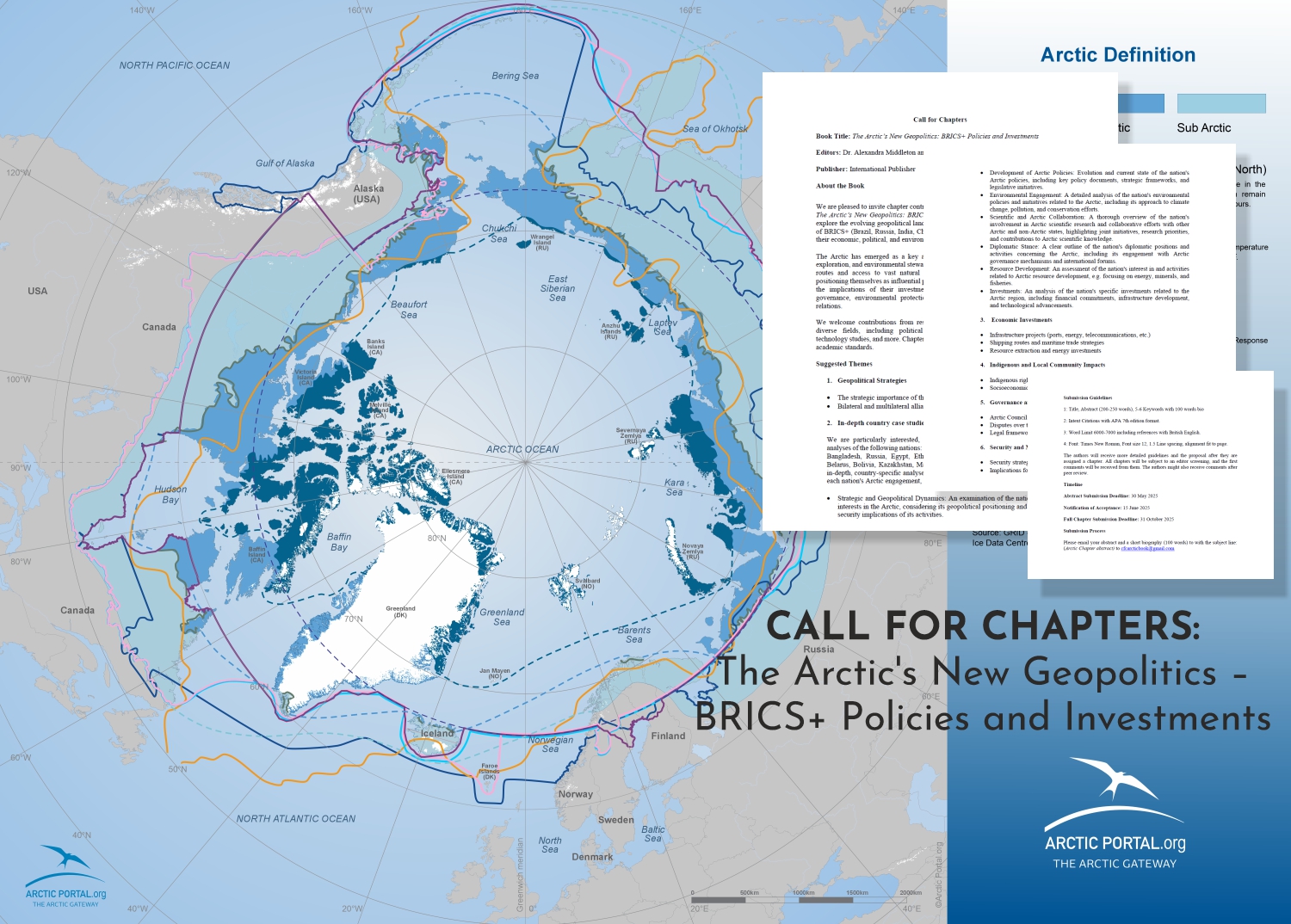A call for contributions has been announced for the upcoming edited volume The Arctic's New Geopolitics: BRICS+ Policies and Investments, under the editorial guidance of Dr. Alexandra Middleton and Dr. Monojit Das.

This timely publication will explore the expanding influence of BRICS+ countries (Brazil, Russia, India, China, South Africa, and others) in the Arctic region.
Through political, economic, environmental, and strategic lenses, the book aims to provide a comprehensive analysis of how these emerging powers are reshaping Arctic dynamics.
Contributions are invited on key themes such as geopolitical strategies, economic investments, impacts on Indigenous and local communities, governance and international law frameworks, security and military presence, and the specific Arctic engagement strategies of BRICS+ nations. Country-specific chapters focused on individual BRICS+ countries are especially welcome.
Prospective authors are asked to submit an abstract of 200–250 words, including 5–6 keywords, along with a brief 100-word author biography.
Final chapters should be between 6,000–7,000 words (including references) and formatted in APA style, using Times New Roman, 12-point font, and 1.5 line spacing.
Key Dates:
- Abstract submission deadline: 30 May 2025
- Notification of acceptance: 15 June 2025
- Full chapter deadline: 31 October 2025
Submissions should be sent to with the subject line “Arctic Chapter Abstract.”
Scholars, policymakers, and practitioners from all disciplines are encouraged to contribute to this important volume on the evolving role of BRICS+ countries in the Arctic. Colleagues and institutions are welcome to share this call within their networks.
Suggested Themes
1. Geopolitical Strategies
- The strategic importance of the Arctic for BRICS+ countries
- Bilateral and multilateral alliances in the region
2. In-depth country case studies
Particular interest is given, though not exclusively, to country-by-country analyses of the following nations: China, India, South Africa, Brazil, Pakistan, Bangladesh, Russia, Egypt, Ethiopia, Iran, United Arab Emirates, Indonesia, Belarus, Bolivia, Kazakhstan, Malaysia, Thailand, Uganda, and Uzbekistan. These in-depth, country-specific analyses should provide a comprehensive exploration of each nation's Arctic engagement, addressing the following key dimensions:
- Strategic and Geopolitical Dynamics: An examination of the nation's strategic interests in the Arctic, considering its geopolitical positioning and the potential security implications of its activities.
- Development of Arctic Policies: Evolution and current state of the nation's Arctic policies, including key policy documents, strategic frameworks, and legislative initiatives.
- Environmental Engagement: A detailed analysis of the nation's environmental policies and initiatives related to the Arctic, including its approach to climate change, pollution, and conservation efforts.
- Scientific and Arctic Collaboration: A thorough overview of the nation's involvement in Arctic scientific research and collaborative efforts with other Arctic and non-Arctic states, highlighting joint initiatives, research priorities, and contributions to Arctic scientific knowledge.
- Diplomatic Stance: A clear outline of the nation's diplomatic positions and activities concerning the Arctic, including its engagement with Arctic governance mechanisms and international forums.
- Resource Development: An assessment of the nation's interest in and activities related to Arctic resource development, e.g. focusing on energy, minerals, and fisheries.
- Investments: An analysis of the nation's specific investments related to the Arctic region, including financial commitments, infrastructure development, and technological advancements.
3. Economic Investments
- Infrastructure projects (ports, energy, telecommunications, etc.)
- Shipping routes and maritime trade strategies
- Resource extraction and energy investments
4. Indigenous and Local Community Impacts
- Indigenous rights and representation in Arctic governance
- Socioeconomic impacts of foreign investments
5. Governance and International Law
- Arctic Council engagement and BRICS+ participation
- Disputes over territorial claims and maritime boundaries
- Legal frameworks for Arctic development
6. Security and Military Presence
- Security strategies and military build-up in the Arctic
- Implications for global stability and peace
Map: Arctic Portal
